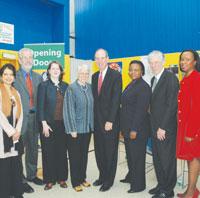On Sept. 20, UMass Boston made a huge step in fulfilling its “Urban Mission” to serve the surrounding community. UMass Boston and Children’s Hospital Boston announced at the Roxbury YMCA the details of a $4 million grant from the US Department of Education to fund programs that will help open the doors of opportunity for young people with disabilities.
The joint effort between UMass Boston and the Children’s Hospital is known as the Institute for Community Inclusion, and is an effort to pilot interventions designed to better identify, integrate and transition into their communities, underserved children with disabilities and special health care needs.
“As a higher educational institution committed to the academic and professional development of a diverse student body, we have a track record of success in educating young adults with disabilities that we believe can serve as a national model,” Michael F. Collins, MD, chancellor of UMass Boston said. “We look forward to being able to expand on these efforts and develop best practices.”
The grant will focus on three key areas dealing with disabilities. The first is helping children with disabilities transition into adulthood. The second is getting access to community recreational activities and physical fitness for the disabled. The final prong of the effort is making improvements in screening and early identification. By working with families, community-based organizations, disability organizations, recreational centers, schools, clinics and community health centers, ICI seeks to work on these three areas and improve each one, focusing on people in underserved populations. In a press release, ICI stated that the latest national estimates show that at least 13 percent of children in the US have or are at risk for physical, developmental or emotional conditions that require higher levels of service. ICI also asserted that children who live in poverty are at even higher risk for the development of these disabilities because health factors found in underserved areas, such as malnutrition, anemia, physical and mental illness, substance abuse and domestic violence.
Greater inclusion of disabled people in society comes to the forefront this month, as October is the official National Disability Employment Awareness Month. Last week, Senator John Kerry (D-MA) wrote an opinion column in the Metro offering his view on including the disabled. Senator Kerry expressed disappointment over the fact that the employment rate for the disabled is at 38 percent, a full percent below the average for people without disabilities. ICI and UMass Boston are working hard to close this gap through their endeavor.
Senator Kerry also praised President Clinton’s efforts to increase employment and inclusion for those with disabilities while criticizing President Bush for his noncompliance with an executive order passed by Clinton seeking to employ 10,000 disabled persons in the public sector.
The presence of disabled persons joining the workforce is becoming especially important as baby boomers retire and jobs begin to open up. The first element that ICI will be focusing on, that of helping people with disabilities transition to adulthood will help to increase employment opportunities for the disabled.
Before many developments in medicine over the last decade, people with disabilities often did not reach adulthood. For example, the average age of death from cystic fibrosis was 6 months in 1938. By 1998, the average life expectancy climbed to 32. Unfortunately, educational, social and clinical services have not kept pace with life expectancy. The center created through the grant will provide research, training and technical assistance to address these pressures and help build the self esteem, confidence and leadership skills of youth with disabilities so they may be competent, independent and fulfilled adults.
Children and adolescents with disabilities and special health care needs often do not have access to recreational and social activities. The poor are especially limited in their opportunities for socialization. The center will be training individuals to work with disabled children on weekly basis, involving them in exercise and recreation at home and in the community. Training will also be provided to community recreation centers to help them accommodate those with special needs.
The best possible outcomes for children with developmental delays occur when intervention happens as early as possible. Currently only 20 to 30 percent of children with disabilities such as speech and language impairments, mental retardation, learning disabilities, or emotional and behavioral disturbances are identified prior to school. The grant will fund a demonstration program that will integrate a proven, standardized developmental screening method into the pediatric primary care system at Martha Eliot Health Center in Jamaica Plain.
When the University was created, one of the important aspects it was founded on was a commitment to the surrounding community and helping the disadvantaged. This grant provides UMass Boston with a real opportunity to effectuate meaningful change.

